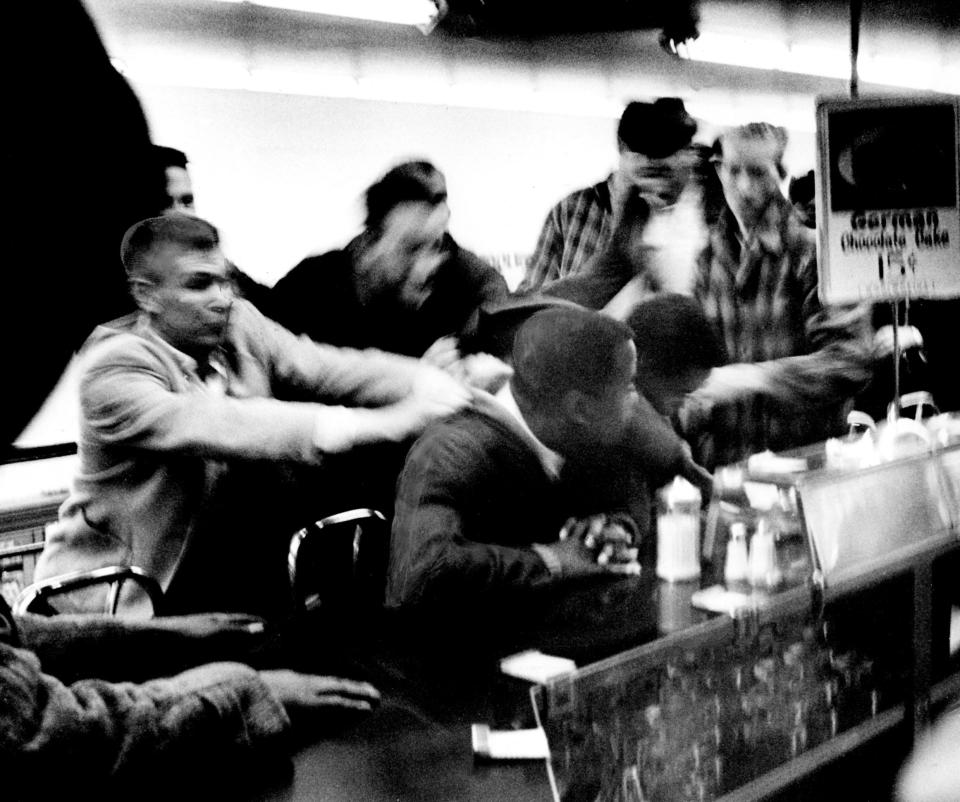'Nashville prepared me,' John Lewis said of his first sit-in arrest 60 years ago. 'We grew up very fast.'
White men kicked them. They spat and blew cigar smoke in their faces. They extinguished lit cigarettes on their backs.
Still, the black students who sat at Nashville's lunch counters did not retaliate.
They had been trained in nonviolent resistance.
They remained silent, staring ahead or reading magazines, in protest of segregation. Just as they had during the sit-ins the week before. And the week before that.
But this time would be different.
For the first time since hundreds of black college students began the sit-ins at Nashville's downtown drugstores, tempers flared.

On Feb. 27, 1960, nearly 100 young African Americans, along with a few white supporters, were arrested and jailed.
Future U.S. Rep. John Lewis was among them. It marked the first of his many arrests to come.
On that historic day 60 years ago, tensions escalated between crowds of white instigators and the composed young black men and women who wanted integration and equality.
The students came from local universities: Fisk, Tennessee A&I and the American Baptist Theological Seminary. They entered Woolworth's, Walgreens and McLellan's.
Thousands of people — white and black — crammed the area downtown, and policemen armed with billy clubs lined the streets.
They were stationed there, they said, to thwart an outbreak of violence.
Two fistfights broke out that day. The first started when a white man jerked a young white male demonstrator from his lunch counter chair at McLellan's and hit him.
It was the protester, not the aggressor, who was arrested.
The black students, passively unmoved by the jeering and provocation surrounding them, were also taken into custody and charged with disorderly conduct.
Loud shouts of praise and applause erupted from the crowd as officers put the first group of students into the paddy wagons shortly after 1 p.m. that day.
An hour later, the police were summoned to Woolworth's next door. There, the only black student to respond to the day's hateful acts was dragged from the store, swinging wildly. He was charged with disorderly and offensive conduct and resisting arrest.
The young white man who instigated the fight was not arrested. He slipped out of sight.
More arrests took place throughout the afternoon, dozens at a time. As soon as one group was led away, more students were there to sit in their place.
"You haven't seen anything yet," sit-in leader Earl May told a Tennessean reporter that day. "We're going to fill their jails. That's a promise."
Two days later, the students arrested during the weekend’s sit-in went on trial.
Many were represented in court by Nashville councilman and attorney Z. Alexander Looby. Some chose “jail over bail.” Fifteen students were convicted and sent to the city workhouse after refusing to pay the $50 fines.
The fight was just beginning.
"Nashville prepared me," Lewis told The Tennessean in 2013. "If it hadn't been for Nashville, I would not be the person I am now.
"We grew up sitting down or sitting in. And we grew up very fast."
Reach Jessica Bliss at 615-259-8253 and jbliss@tennessean.com or on Twitter @jlbliss and please support local journalism.
This article originally appeared on Nashville Tennessean: US Rep. John Lewis' first sit-in arrest was 60 years ago in Nashville

